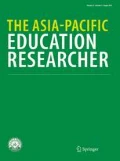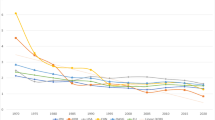Abstract
Shanghai has attracted widespread attention with the impressive performance of its students in the OECD PISA. Increasing efforts have been made to study Shanghai’s education system, particularly the reasons for its success and the implications of Shanghai’s system for other societies. This study analyses three natures of the education system in Shanghai: selection, justice and independence. Against the backdrop of Chinese social change, Shanghai’s reforms in the post-Mao era are analysed, and the special features of its education system compared with those in other regions of China are discussed. An analysis of the three natures of education suggests that they are intrinsically intertwined in Shanghai’s restructuring of the schooling system to cater to socioeconomic development, but how to realise justice through education remains at the core of the educational changes that are continuously negotiated between different stakeholders in the education field.
Similar content being viewed by others
References
Bai, L. M. (2010). Human capital or humane talent? Rethinking the nature of education in China from a comparative historical perspective. Frontier of Education in China, 5(1), 104–129. doi:10.1007/s11516-010-0008-z.
Bates, R. (2006). Public education, social justice and teacher education. Asia-Pacific Journal of Teacher Education, 34(3), 275–286. doi:10.1080/13598660600927067.
Carney, S. (2009). Negotiating policy in an age of globalization: Exploring educational ‘policyscapes’ in Denmark, Nepal, and China. Comparative Education Review, 53(1), 63–88. doi:10.1086/593152.
Chan, K. K. D., & Ngok, K.-L. (2001). Towards centralization and decentralization in educational development in Shanghai. Education and Society, 19(3), 59–78. doi:10.1007/978-94-007-0956-0_5.
Cheng, K. (2011). Shanghai: How a big city in a developing country leaped to the head of the class. In M. Tucker (Ed.), Surpassing Shanghai: An agenda for American education built on the world’s leading systems (pp. 21–50). Cambridge: Harvard Education Press.
Ding, X. J. (2008). Policy metamorphosis in China: A case study of minban education in Shanghai. China Quarterly, 195, 656–674. doi:10.1017/S0305741008000817.
Duan, Y. (2013). Reports on the reform and development of Shanghai’s basic education during the Eleventh Five-Year period (in Chinese). Retrieved May 25, 2013, from http://edu.china.com.cn/2013-03/01/content_28102005.htm.
Feng, Y. (1995). From the imperial examination to the national college entrance examination: The dynamics of political centralism in China’s educational enterprise. Journal of Contemporary China, 4(8), 28–56. doi:10.1080/10670569508724213.
Francis, C.-B. (2001). Quasi-public, quasi-private trends in emerging market economies: The case of China. Comparative Politics, 33(3), 275–294.
Fu, L. J. (2007). Retrospect and prospect: Overviewing the trend of Shanghai basic education development. Exploring Education Development, 9, 46–55.
Gerald, G. (1989). Education: Commodity or public good? British Journal of Educational Studies, 37(3), 207–221.
Hayhoe, R. (1989). China’s universities and the open door. Armonk: M.E. Sharpe.
Horn, D. (2009). Age of selection counts: A cross-country analysis of educational institutions. International Journal on Theory and Practice, 15(4), 343–366. doi:10.1080/13803610903087011.
Hu, B. Y., & Szente, J. (2010). Education of young Chinese migrant children: Challenges and prospects. Early Childhood Education Journal, 37(6), 477–482. doi:10.1007/s10643-009-0362-8.
Jiang, X. Q. (2009). Realities of education reform in China. Far Eastern Economic Review, 172(10), 50–51.
Jiang, H. B. (2013). Shanghai released the data: the shape increase of floating population makes educational resources inadequate. The people’s daily. 2013. p 12. (in Chinese).
Kosack, S. (2012). The education of nations: How the political organization of the poor, not democracy, led governments to invest in mass education. Oxford: Oxford University Press.
Lai, M. H., & Lo, L. N. K. (2007). Teacher professionalism in educational reform: The experiences of Hong Kong and Shanghai. Compare, 37(1), 53–68. doi:10.1080/03057920601061786.
Lee, S. E. (2013). Education as a human right in the 21st century. Democracy and Education, 21(1), 1–9.
Li, A. M. (2012). Shanghai delivered the plan for reform and development in basic education during the Twelfth Five-Year Plan period (in Chinese). Retrieved May 12, 2013, from http://politics.people.com.cn/h/2012/0103/c226651-3867884340.html.
Li, L. F. (2013). A narrative study of thirty years of entrance exam reform in Shanghai. Chinese Education and Society, 46(1), 23–31. doi:10.2753/CED1061-1932460102.
Lin, T. J., Zhang, S. J., & Shi, S. A. (2009). Study on the intramunicipal inequality in financing basic education in Shanghai (2001–2006). Chinese Education & Society, 42(5), 54–71. doi:10.2753/CED1061-1932420504.
Liu, H.-M., Tan, H.-W., & Tian, Y.-Y. (2013). Unbalanced education development among different regions in China. Journal of Applied Statistics and Management, 32(4), 586–594. doi:11.2242.01.20130426.1323.004. (in Chinese).
Lu, J. (2013). Empirical research on equity of basic education in Shanghai. Educational Research, 2, 77–84. (In Chinese).
Ma, L. (2011). Reliability and valid of the independent admission tests of universities in Shanghai. Journal of Shanghai Jiaotong University, 45(12), 1831–1835. (in Chinese).
National Bureau of Statistics of China (2011). Communiqué of the National Bureau of Statistics of People’s Republic of China on major figures of the 2010 population census (in Chinese). Retrieve April 28, 2013, from http://www.stats.gov.cn/english/newsandcomingevents/t20110429_402722516.htm.
Ngok, K. (2007). Chinese education policy in the context of decentralization and marketization: Evolution and implications. Asia Pacific Education Review, 8(1), 142–157. doi:10.1007/BF03025840.
Nguyen, T., & Pfleiderer, M. (2013). International Empirical Findings about the Success of Education and School Policy. International Education Studies, 6(2), 188–196. doi:10.5539/ies.v6n2p188.
OECD (2011). Lessons from PISA for the United States, strong performers and successful reformers in education (pp. 83–115). Retrieved April 10, 2013, from http://dx.doi.org/10.1787/9789264096660-en.
Postiglione, G. A. (Ed.). (2006). Education and social change in China: Inequality in a market economy. Armonk: M.E. Sharpe.
Research Team on the Effect of the Independent Admission of Higher Education Institutions on Secondary Education in Jiangsu, Zhejiang and Shanghai. (2009). Problems and counter-strategies of the independent admission of higher education institutions. Shanghai Education Research, 6, 4–8. (In Chinese).
Sellar, S., & Lingard, B. (2013a). Looking East: Shanghai, PISA 2009 and the reconstitution of reference societies in the global education policy field. Comparative Education, 49(4), 464–485. doi:10.1080/03050068.2013.770943.
Sellar, S., & Lingard, B. (2013b). The OECD and the expansion of PISA: New global modes of governance in education. British Educational Research Journal Early View,. doi:10.1002/berj.3120.
Shanghai Municipal Government (2010). The Shanghai medium and long term outline on educational reform and development (2010–2020) (in Chinese). Retrieved April 28, 2013, from http://news.xinhuanet.com/edu/2010-09/09/c_12537017.htm.
Su, C., & Liu, Y. M. (2006). Project summary of ‘education in harmonious Shanghai’. Research on Educational Development, 1B, 28–34. (in Chinese).
Tan, C. (2011). Framing educational success: A comparative study of Shanghai and Singapore. Education, Knowledge and Economy, 5(3), 155–166. doi:10.1080/17496896.2012.673939.
Tan, C. (2012). The culture of education policy making: Curriculum reform in Shanghai. Critical Studies in Education, 53(2), 153–167. doi:10.1080/17508487.2012.672333.
Tan, C. (2013). Learning from Shanghai: Lessons on achieving educational success. Dordrecht: Springer.
Thrupp, M., & Tomlinson, S. (2005). Introduction: Education policy, social justice and ‘complex hope’. British Educational Research Journal, 31(5), 549–556. doi:10.1080/01411920500240684.
Tucker, M. (Ed.). (2011). Surpassing Shanghai: An agenda for American education built on the world’s leading systems. Cambridge: Harvard Education Press.
Vandenberghe, V. (1999). Combining market and bureaucratic control in education: An answer to market and bureaucratic failure? Comparative Education, 35(3), 271–282.
Wang, Q. (2010). The situation, challenges and development strategies of private education in Shanghai. Research in Educational Development Z2, 1–2, 17. (in Chinese).
Wang, L., & Holland, T. (2011). In search of educational equity for the migrant children of Shanghai. Comparative Education, 47(4), 471–487. doi:10.1080/03050068.2011.559701.
West, A. (2006). School choice, equity and social justice: The case for more control. British Journal of Educational Studies, 54(1), 15–33. doi:10.1111/j.1467-8527.2006.00334.x.
Wilson, J. (1989). Selection, independence and justice. British Journal of Educational Studies, 37(3), 285–295.
Wong, J. L. N. (2012). How has recent curriculum reform in China influenced school-based teacher learning? An ethnographic study of two subject departments in Shanghai, China. Asia-Pacific Journal of Teacher Education, 40(4), 347–361. doi:10.1080/1359866X.2012.724654.
Xinjingbao (2012). Review: Shanghai-New York University can hardly push bring about a reform in China’s educational system (in Chinese). Retrieved April 10, 2013, from http://scitech.people.com.cn/n/2012/1103/c1057-19486245.
Yu, L., & Suen, H. K. (2005). Historical and contemporary exam-driven education fever in China. KEDI Journal of Educational Policy, 2(1), 17–33.
Zhang, C., & Akbik, A. (2012). PISA as a legitimacy tool during China’s education reform: case study of Shanghai. TranState Working Papers. No. 166. Retrieved October 15, 2013, from http://www.staatlichkeit.uni-bremen.de/pages/pubApBeschreibung.php?SPRACHE=en&ID=207.
Zhang, M. X., & Kong, L. S. (2012). An exploration of reasons for Shanghai’s success in the OECD program for international student assessment (PISA) 2009. Frontiers of Education in China, 7(1), 124–162. doi:10.3868/s110-001-012-0007-3.
Zhao, Z. Z. (2007). Schooling in China. In G. A. Postiglione & J. Tan (Eds.), Going to school in East Asia (pp. 61–85). Westport: Greenwood Press.
Zhao, Z. Z. (2011). A matter of money?: Policy analysis of rural boarding schools in China. Education Citizenship and Social Justice, 6(3), 237–250. doi:10.1177/1746197911417415.
Author information
Authors and Affiliations
Corresponding author
Rights and permissions
About this article
Cite this article
Deng, M., Zhao, Z. The Education System in Shanghai: Negotiating the Nature of Education. Asia-Pacific Edu Res 23, 805–812 (2014). https://doi.org/10.1007/s40299-014-0188-z
Published:
Issue Date:
DOI: https://doi.org/10.1007/s40299-014-0188-z




